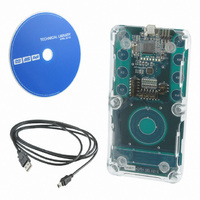ATAVRTS2080A Atmel, ATAVRTS2080A Datasheet - Page 60

ATAVRTS2080A
Manufacturer Part Number
ATAVRTS2080A
Description
KIT QTOUCH W/SW ATMEGA88
Manufacturer
Atmel
Series
QTouch™r
Specifications of ATAVRTS2080A
Sensor Type
Touch, Capacitive
Sensing Range
1 Rotor, 1 Slider, and 2 Buttons/Keys
Interface
Application Programming Interface (API)
Voltage - Supply
1.8 V ~ 5.5 V
Embedded
Yes, MCU, 8-Bit
Utilized Ic / Part
ATmega88
Tool Type
Development Kit
Cpu Core
AVR 8 / 32
Data Bus Width
8 bit
Core Architecture
AVR
Silicon Manufacturer
Atmel
Silicon Core Number
ATmega88, ATmega88A
Silicon Family Name
AVR
Kit Contents
Board, CD
Development Tool Type
Hardware / Software - Eval/Demo Board
Rohs Compliant
Yes
Lead Free Status / RoHS Status
Lead free / RoHS Compliant
Sensitivity
-
Lead Free Status / Rohs Status
Details
- Current page: 60 of 178
- Download datasheet (4Mb)
5.6.10.3.3 Checklist of items for integrating QMatrix Capacitive sensing libraries
When integrating QMatrix acquisition method libraries, ensure the following
5.6.10.4 Common checklist items
5.6.10.4.1 Configuring the stack size for the application
The stack requirements for the QTouch library should be accounted for and the stack size
adjusted in the user’s project for proper operation of the software when using the IAR IDE. This
section lists the stack usage for the different variants of the QTouch and QMatrix acquisition
method libraries applicable to the IAR compiler tool chain.
Note: When using the IAR IDE / compiler tool chain, the map file generated for the application will
list total CSTACK & RSTACK requirements. Please adjust the total CSTACK and RSTACK
values in the IAR project options to be greater than the values listed in the map file. Refer to
section 5.6.11.4 which illustrates how to change the settings in IAR IDE.
Table 5 : Stack requirements of the QTouch capacitive sensing libraries when using IAR IDE
projects
60
In case of XMega devices, the resources are used internal to the library and hence cannot be
used by the host application
•
•
•
Check that the CLKPR register is available for the selected device. If not remove the
CLKPR statements.
Ensure that the configuration for the QMatrix is done in touch_qm_config.h and the
arrays of the x_line_info and y_line info are filled as indicated section 5.8.2
MCUCR register is available and if so disable pullups
Check if the timer registers and bit fields used are correct and change them if necessary.
The above settings can be modified by the user by changing the API’s that are available
to the user. The API’s include
The host application must provide the current time.
This information is passed to the library as an argument to the function
qt_measure_sensors()”. This is used for time-based library operations such as drift
compensation.
The GPIO internal pull-ups must be disabled for all port pins used for touch sensing when
calling the library.
For 8-bit AVR devices, this can be done by
Setting the JTD bit in the “MCUCR” register to disable JTAG Interface in MCU ( if
available ). This can be done only when the JTAG lines are in conflict with the desired
touch sensing lines.
The library must be called often enough to provide a reasonable response time to user
touches. The typical time to call the library is from 25 ms to 50 ms.
Care should be taken while using the ADC conversion logic and QMatrix library such that
the host application waits for approximately 1msec before actually calling the
qt_measure_sensors() API depending upon the ADC clock.
o
o
o
o
qt_set_parameters ( )
a. Setting the “PUD” bit in the “MCUCR” register or
b. Setting the “PUD” bit in the “SFIOR” register.
Analog Comparator0 on PORTA (AC0 on PORTA)
Timer/Counter1 on PORTC (TCC1)
Event System Channel0 (EVSYS_CH0)
8207J-AT42-02/11
Related parts for ATAVRTS2080A
Image
Part Number
Description
Manufacturer
Datasheet
Request
R

Part Number:
Description:
DEV KIT FOR AVR/AVR32
Manufacturer:
Atmel
Datasheet:

Part Number:
Description:
INTERVAL AND WIPE/WASH WIPER CONTROL IC WITH DELAY
Manufacturer:
ATMEL Corporation
Datasheet:

Part Number:
Description:
Low-Voltage Voice-Switched IC for Hands-Free Operation
Manufacturer:
ATMEL Corporation
Datasheet:

Part Number:
Description:
MONOLITHIC INTEGRATED FEATUREPHONE CIRCUIT
Manufacturer:
ATMEL Corporation
Datasheet:

Part Number:
Description:
AM-FM Receiver IC U4255BM-M
Manufacturer:
ATMEL Corporation
Datasheet:

Part Number:
Description:
Monolithic Integrated Feature Phone Circuit
Manufacturer:
ATMEL Corporation
Datasheet:

Part Number:
Description:
Multistandard Video-IF and Quasi Parallel Sound Processing
Manufacturer:
ATMEL Corporation
Datasheet:

Part Number:
Description:
High-performance EE PLD
Manufacturer:
ATMEL Corporation
Datasheet:

Part Number:
Description:
8-bit Flash Microcontroller
Manufacturer:
ATMEL Corporation
Datasheet:

Part Number:
Description:
2-Wire Serial EEPROM
Manufacturer:
ATMEL Corporation
Datasheet:












